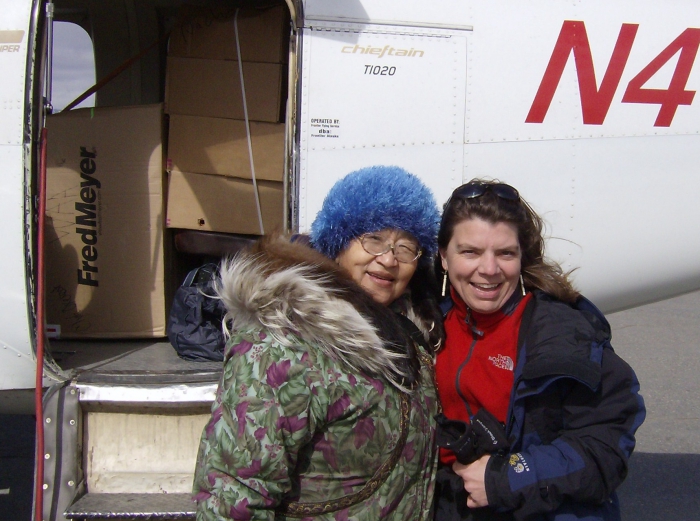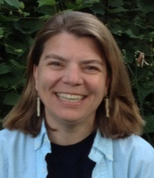By: Jean E. Balestrery, PhD, MA, MSW, LICSW, MAC, Scholar-Practitioner in health equity; Hampton Faculty Fellow, Spirit of Eagles Program, Mayo Clinic
Dementia is on the rise around the world, and health organizations in Canada and the United States are responding to the urgent need—voiced by communities and practitioners—for guidance on how best to address memory loss in Indigenous communities. Eliminating associated health disparities in Alaska's Indigenous populations is a related priority. These disparities are typically addressed through Alaska's conventional health and social service organizations, whose health care delivery system can create cultural disjuncture based on "rhetorical ruptures—gaps between the rhetoric of care service provided and Alaska Native cultural communication practices." (Balestrery 2014) Collaborating across cultural differences is key to eliminating these disparities.
An example of effective collaboration between two women from different worlds is illustrated in the teaching story, "A Fecund Frontier: We listen…in between talk…We listen…", that highlights "story-telling as medicine" (Hulko, Balestrery & Wilson 2019) in the book Indigenous Peoples and Dementia: Memory Loss and Memory Care published by UBC Press earlier this year (2019). Collaborating across the urban-rural divide in Alaska, these women show that listening can be transformative and healing.

The basis for this teaching story extended over many years between an Alaska Native Iñupiat Elder, originally from Cape Prince of Wales, a remote rural Alaska village, and a woman (Balestrery) among the lesbian, gay, bisexual, transgender, two-spirit, queer (LGBTTQ) community from the Lower-48 with childhood roots in São Paolo, Brazil. These women met as social workers and later continued together in research based on extensive ethnography, older adult participatory action research, community engaged research, and relational research approaches. The Iñupiat Elder participated as an Elder cultural consultant and received compensation as a co-researcher through research study funding sources. During an anthropology and gerontology academic conference, an attendee noted that researchers were very impressed with this cross-cultural collaboration, explaining, "It is the exact opposite of helicopter research and what we are all striving to work toward as a model—but we wonder how it could ever be replicated?" The Iñupiat Elder responded, "Well, why not? We're doing it, aren't we?"
She also said, "I think what's happening here is really great. When I was growing up, I never heard about this dementia. We didn't have a word for it in my Inupiaq language. It's a problem, though, so we need to deal with it, but just like everything else, we need to do it slowly, otherwise it will be retraumatizing."
Jean E. Balestrery previously conducted her dissertation study, "A Multi-sited Ethnographic Study in Alaska: Examining the Culture-communication Nexus Salient to Alaska Native Elders and Conventional Health and Social Services" from 2011–2014, following many years of pre-dissertation research, clinical social work practice, and university teaching experience. It was funded by the John A. Hartford Foundation, The Reed Foundation, and University of Michigan Joint PhD Program in Social Work and Anthropology. This study examined communication practices that are critical to health and social service delivery processes relevant to Alaska Native peoples in Alaska. In doing so, the study brought awareness to communication as a cultural system and service delivery as culturally contextualized. Study findings evidenced a cultural disjuncture, which is based on "rhetorical ruptures — gaps between the rhetoric of care service provided and Alaska Native cultural communication practices" (Balestrery 2014). Notably, rhetorical ruptures contribute to "culturally charged spaces" (Balestrery 2016) in Alaska's conventional health and social service settings, which are culturally pluralistic and will continue to be that way. Alaska Native Elders describe these "culturally charged spaces" as "generational curses-a pain, prejudice on both sides-wounded, value-systems clash-fighting" (Balestrery 2016). Study recommendations include that collective accountability and responsibility are necessary to reduce intercultural anxieties and Alaska Native health disparities (Balestrery 2014). In addition, study recommendations include, promoting a paradigm of intercultural care whereby colonial histories connect to contemporary healing, cultural ideologies to communication codes, and rhetorical ruptures to violations of Indigenous human rights (Balestrery 2014, 2015). Balestrery disseminated study findings to multiple community-based stakeholders including direct service providers in social work and allied health professions, local community members, and tribal leaders throughout Alaska, in addition to peer-reviewed journal articles. As a result of these activities, Balestrery was invited to join the Cultural Committee in Northwest Alaska, which "is revitalizing Alaska Native traditional values and cultural practices in the region in its efforts to connect treatment to tradition" (Cultural Committee 2017).
Further information is available via a National Association of Social Workers Social Work Talks Podcast, Indigenous Peoples and Dementia
For additional information, contact Jean E. Balestrery by email (jbalestrery [at] gmail.com) or by phone: 612-308-4234.
References
Balestrery, J.E. 2016. Indigenous Elder Insights about Care Organizations in Alaska:
Culturally Charged Spaces. Journal of Gerontological Social Work.
Balestrery, J.E. 2015. Abstract (expanded version): A Multi-Sited Ethnographic Study in
Alaska: Examining the Culture-Communication Nexus Salient to Alaska Native Elders and Conventional Health and Social Services. Alaska Journal of Anthropology.
Balestrery, J.E. 2014. A Multi-Sited Ethnographic Study in Alaska: Examining the Culture-
Communication Nexus Salient to Alaska Native Elders and Conventional Health and Social Services. (Doctoral dissertation). University of Michigan Joint Doctoral Program in Social Work and Anthropology. Ann Arbor, Michigan.
Balestrery, J.E. & Nothstine, S. 2019. A Fecund Frontier: We Listen…in between Talk…we
Listen (pp. 146-177). In W. Hulko, D. Wilson and J.E. Balestrery (Eds.) Indigenous Peoples and Dementia: New Understandings of Memory Loss and Memory Care. British Columbia, Canada: UBC Press.
Cultural Committee. Spring 2017. Liitfik. First Alaskans, The Magazine of Native
Peoples, Communities and Ways of Life. Anchorage, Alaska: First Alaskans Institute. pp. 22–23
Hulko, W., Wilson, D. & Balestrery, J. E. (Eds.). 2019. Indigenous Peoples and Dementia:
New Understandings of Memory Loss and Memory Care. British Columbia, Canada: UBC Press.
Hulko, W., Balestrery, J.E. & Wilson, D. 2019. Introduction. In W. Hulko, D.
Wilson and J.E. Balestrery (Eds.). Indigenous Peoples and Dementia: New Understandings of Memory Loss and Memory Care. British Columbia, Canada: UBC Press. pp. 3–18.
About the Author
 Jean E. Balestrery, PhD, MA, MSW, LICSW, is an interdisciplinary scholar whose research aims to improve health and social service outcomes particularly for marginalized communities. She earned a Ph.D. degree in social work and anthropology from University of Michigan, an MA in anthropology from University of Michigan, an MSW from University of Washington and a BA from Brown University. She is co-editor and author of "Indigenous Peoples and Dementia: New Understandings of Memory Loss and Memory Care" (UBC Press).
Jean E. Balestrery, PhD, MA, MSW, LICSW, is an interdisciplinary scholar whose research aims to improve health and social service outcomes particularly for marginalized communities. She earned a Ph.D. degree in social work and anthropology from University of Michigan, an MA in anthropology from University of Michigan, an MSW from University of Washington and a BA from Brown University. She is co-editor and author of "Indigenous Peoples and Dementia: New Understandings of Memory Loss and Memory Care" (UBC Press).
